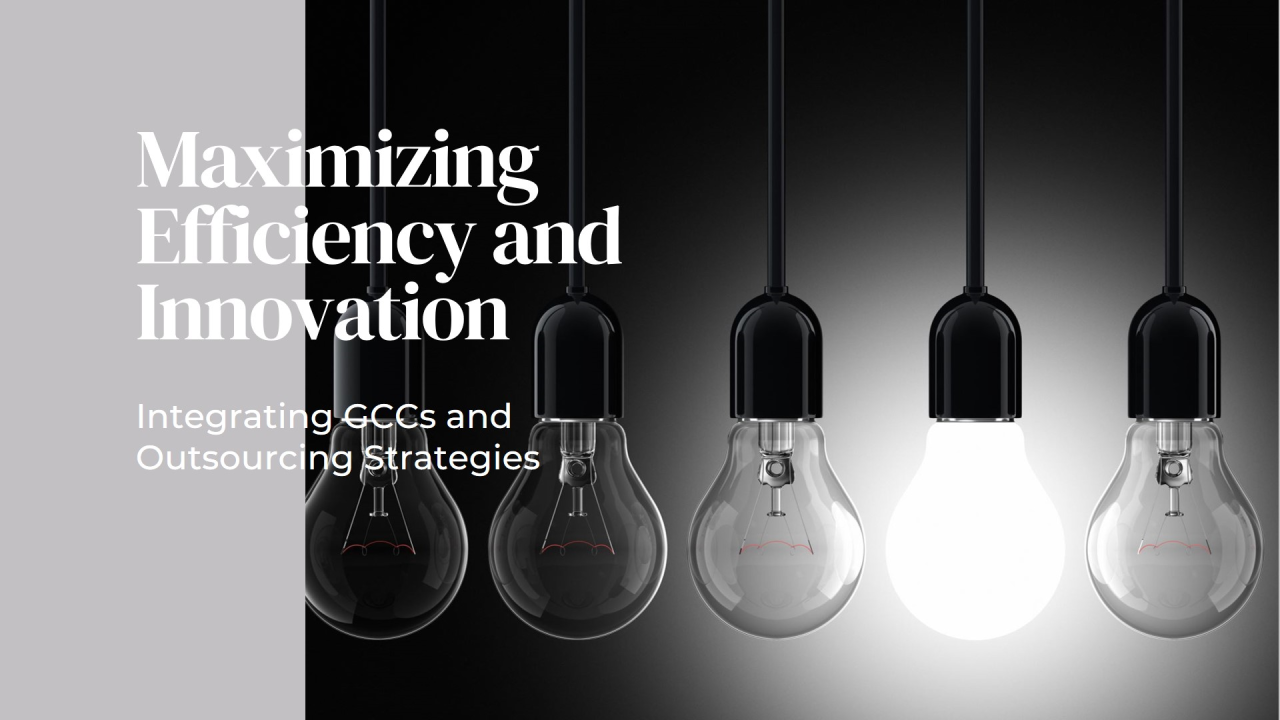Benefits of 3rd Party Outsourcing vs a GCC

July 4th,
2024
In today's highly competitive business environment, companies constantly seek ways to optimize costs and improve efficiency. One of the key decisions many businesses face is whether to outsource services to third-party providers or to establish their global cost centres. While both approaches have their advantages, third-party outsourcing often proves to be more cost-effective. Here's why:
1. Reduced Capital Expenditure
Establishing a global cost centre requires significant capital investment. Companies must spend on infrastructure, technology, real estate, and other fixed assets. On the other hand, outsourcing to a third party eliminates these upfront costs. Outsourcing partners already have the necessary infrastructure, allowing companies to avoid heavy capital expenditures and invest their resources elsewhere.
Case Study: ABC Tech Inc.
ABC Tech Inc., a mid-sized software company, faced a decision: invest $10 million in setting up a global cost centre in India or outsource their IT support to an established provider. By choosing to outsource, they avoided the hefty initial investment and instead opted for a service contract costing $1 million per year. This decision not only saved them significant capital but also allowed them to remain agile in a rapidly changing market. Furthermore, the outsourcing partner's pre-existing infrastructure and expertise ensured a seamless transition and immediate operational efficiency.
2. Lower Operational Costs
Operating a global cost centre involves ongoing expenses such as salaries, benefits, utilities, and maintenance. Third-party outsourcing providers can offer these services at a lower cost due to economies of scale. They spread their operational costs across multiple clients, which reduces the cost per client. Moreover, outsourcing providers often operate in regions with lower labor costs, which translates into significant savings for businesses.
Case Study: XYZ Global Retail Corp.
XYZ Global Retail Corp. needed to streamline its customer service operations. By outsourcing to a third-party provider in the Philippines, they reduced their operational costs by 40%. The outsourcing partner's ability to manage a high volume of customer interactions efficiently at a lower cost significantly improved Global Retail Corp.'s bottom line. Additionally, the outsourcing provider's advanced customer service training programs resulted in higher customer satisfaction and retention rates, further benefiting Global Retail Corp.
3. Access to Specialized Expertise
Building a global cost centre requires hiring skilled professionals and continuously investing in their training and development. Outsourcing firms, however, have already invested in recruiting and training specialized talent. By outsourcing, companies gain access to a pool of experts without incurring the costs associated with hiring and training them internally.
Case Study: AXZ Pharma
AXZ Pharma, a pharmaceutical company, needed regulatory compliance consulting. Setting up an internal team would have cost them over $2 million annually. Instead, they outsourced to a specialized firm with deep expertise in regulatory affairs for $500,000 per year, ensuring compliance while saving substantial costs. This specialized firm also provided insights into upcoming regulatory changes, allowing AXZ Pharma to proactively adjust its strategies and avoid potential compliance issues.
4. Scalability and Flexibility
Global cost centers often lack the flexibility to quickly scale operations up or down in response to market demands. This can lead to inefficiencies and higher costs during periods of low demand. Outsourcing providers, however, offer scalable solutions that can be adjusted based on a company's needs. This flexibility allows businesses to manage costs more effectively and adapt to changing market conditions.
Case Study: E-Commerce Giant
An e-commerce giant experienced fluctuating demand during the holiday seasons. By outsourcing their logistics and customer support, they were able to scale up operations during peak times and scale down during off-peak periods. This flexibility saved them millions in operational costs compared to maintaining a large, permanent global cost centre. The outsourcing partner's ability to quickly onboard and train temporary staff ensured that service quality remained high during peak periods, maintaining customer satisfaction.
5. Focus on Core Competencies
Managing a global cost centre can distract a company from its core business activities. By outsourcing non-core functions, companies can focus on what they do best, improving their competitive advantage. Outsourcing allows businesses to allocate more resources to innovation, customer service, and other areas that directly contribute to their growth and profitability.
Case Study: FinTech Start-Up
A FinTech start-up chose to outsource its HR and payroll functions to focus on developing its financial technology products. This decision allowed them to streamline operations and dedicate more resources to product development, accelerating their growth and market entry. By partnering with a reputable HR outsourcing firm, the start-up also benefited from improved HR processes and employee satisfaction, which contributed to a more motivated and productive workforce.
6. Risk Mitigation
Operating a global cost centre involves various risks, including compliance with local regulations, geopolitical instability, and currency fluctuations. Outsourcing providers often have a better understanding of these risks and have measures in place to mitigate them. By outsourcing, companies can transfer some of these risks to their service providers, reducing their exposure and potential costs.
Case Study: Manufacturing Conglomerate
A manufacturing conglomerate faced regulatory challenges in multiple countries. By outsourcing their compliance and legal services to a third-party expert with global reach, they reduced their risk exposure and ensured adherence to local laws, avoiding potential fines and legal complications. The outsourcing firm provided real-time updates on regulatory changes and offered strategic advice on navigating complex legal landscapes, allowing the conglomerate to focus on its core manufacturing operations without legal distractions.
7. Access to Advanced Technology
Keeping up with technological advancements can be costly and time-consuming. Outsourcing providers invest heavily in the latest technologies to remain competitive. By partnering with these providers, companies can benefit from cutting-edge technology without the associated costs and complexities of implementing and maintaining it themselves.
Case Study: Financial Services Firm
A financial services firm outsourced its IT infrastructure to a managed services provider with state-of-the-art technology. This partnership allowed them to leverage advanced cybersecurity measures and data analytics tools without the need for substantial capital investment in technology upgrades. The managed services provider also ensured continuous system updates and maintenance, which minimized downtime and enhanced the firm's operational efficiency.
Conclusion
While both third-party outsourcing and establishing a global cost centre have their merits, outsourcing often provides a more cost-effective solution. The reduced capital and operational expenditures, access to specialized expertise, scalability, focus on core competencies, risk mitigation, and access to advanced technology make outsourcing an attractive option for businesses looking to optimize costs and enhance efficiency. By carefully evaluating their needs and selecting the right outsourcing partners, companies can achieve significant cost savings and drive long-term success.



